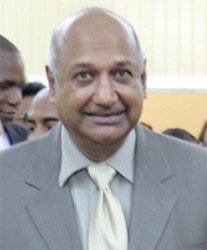Judges, magistrates and members of civil society are currently working together to develop a work plan to address issues hindering the efficiency of the judiciary and to improve its functioning.
At the opening ceremony of a two-day Judicial Reform and Institutional Strengthening (JURIST) Project workshop yesterday, Chancellor of the Judiciary (Ag) Carl Singh urged the participants to focus their efforts on laying the groundwork for an action plan for the Supreme Court.
He reminded those gathered at the Georgetown Club that they are well aware that, at various points in time, concerns have been expressed about the processes and the work of the court system.
“Over time, there have been repeated criticisms about the conduct of the courts; significantly, in relation to its treatment of domestic violence cases and domestic violence victims,” he said, while noting that the business community also bemoans delays in the justice system.

“I would be the first to say, ‘justifiable.’ So that the phenomenon of backlog is perhaps a main, if not an only, concern whenever journalists seek to engage representatives of the judicial administration. It is as though nothing else matters to the journalists or they know nothing else about the work of the courts but they know that there is a backlog. That is an issue that perhaps when careful scrutiny is given to it… the backlog is not as scary as the journalists think it is,” Singh said.
He added that during the workshop it is expected that those present would be involved in making contributions that would result in a programme that will address concerns at both the Magisterial and Supreme Court levels. “We hope to do this in a collective and holistic way,” he stressed.
Meanwhile, Chief Justice (Ag) Yonette Cummings-Edwards explained that the workshop is part of the JURIST project, which is a five-year regional judicial reform initiative that is funded under an arrangement with the government of Canada. She said that it is being implemented on behalf of the Global Affairs of Canada and the Conference of Heads of Judiciary of Caricom and the Caribbean Court of Justice, which was appointed by the conference as its regional execution agency.
The project works with judiciaries across the region to support efforts in improving the administration of justice and to strengthen the ability of the courts within the region to resolve cases efficiently and fairly. She said that the workshop is tasked with this agenda.
She informed that through the project a number of consultations were undertaken within the region and in Guyana. She said commencing in February this year, there were consultations with the judiciary, bench and bar and they have all given an undertaking to assist in the development of the civil procedure rules, among areas where help is needed. She said that those consultations focused on gathering information from regional stakeholders, members of the judiciary, and members of the bar.
Canadian High Commissioner to Guyana Pierre Giroux was present but was unable to speak due to recently developed issue with his voice. Speaking on his behalf, Daniel Joly, Head of Development Aid, said that the workshop is important as it will inform all of the activities to be implemented in Guyana under the JURIST project.
He spoke of Canada’s support for the establishment of the family court and continued support towards the strengthening of Guyana’s judiciary. “Canada works alongside Guyana to safeguard Guyanese citizens and to promote and protect their human rights, particularly those of vulnerable groups, such as women and children and the LGBTI community,” he said.




